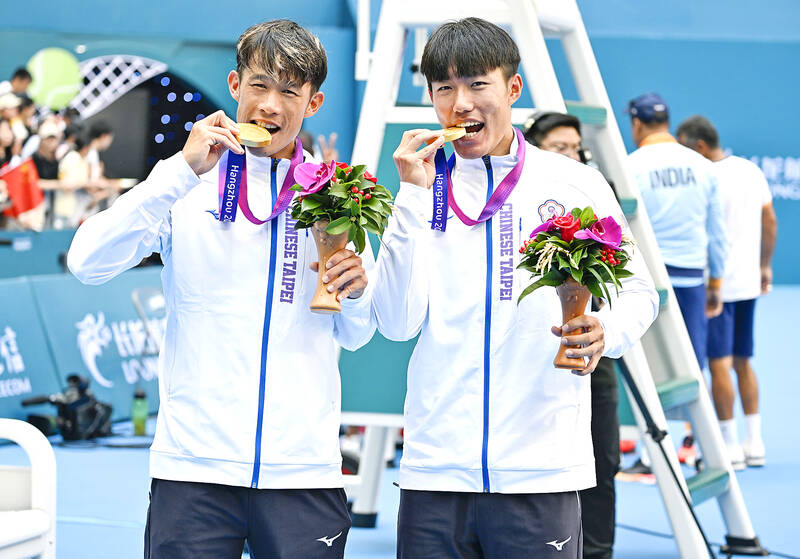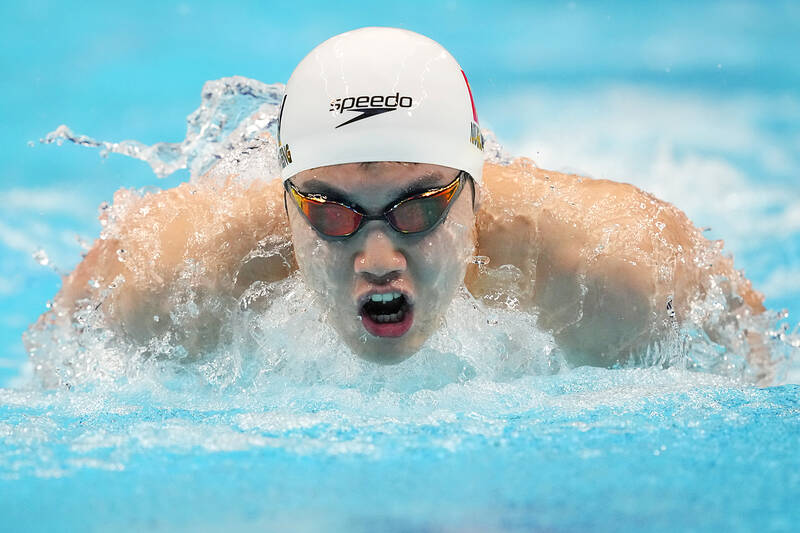Taiwanese tennis players Hsu Yu-hsiou (許育修) and Jason Jung (莊吉生) yesterday dispatched an Indian duo in straight sets in the men’s doubles final to notch Taiwan’s fifth gold medal at the Asian Games in Hangzhou, China.
The unseeded Taiwanese pair upset second seeds Saketh Myneni and Ramkumar Ramanathan of India 6-4, 6-4 in 72 minutes at the Hangzhou Olympic Sports Center.
Hsu and Jung said the result was well beyond their expectations.

Photo: Chen Chih-chu, Taipei Times
“Since this is my first Asian Games, I didn’t think too much about it and only focused on winning a medal,” 24-year-old Hsu said.
Jung, a 34-year-old veteran, praised Hsu for his performance, in particular a return in the ninth game of the second set that Jung capitalized on to break the Indians’ serve for the only time in the set.
Following the men’s doubles final, Hsu claimed a bronze medal in the mixed doubles with Chan Hao-ching (詹皓晴) after they were beaten in their semi-final by Rutuja Bhosale and Rohan Bopanna of India 6-1, 3-6, 10-4.

Photo: AP
Taiwanese swimmer Eddie Wang Kuan-hung (王冠閎) won a silver medal in the men’s 200m butterfly, the first time in 25 years Taiwan won a medal in swimming at the Asian Games.
Wang clocked 1:54.53, beating the Olympic qualifying time of 1:55.78, and finished just behind Tokyo Olympics silver medalist Tomoru Honda of Japan, who set a new Asian Games Record of 1:53.15.
Meanwhile, Taiwan’s Ting Hua-tien (丁華恬) has become the first-ever Taiwanese female athlete to win a gymnastics medal at the Asian Games after taking bronze in the women’s balance beam.
Ting’s medal was Taiwan’s third gymnastics medal at this year’s Asian Games, the other two being Lee Chih-kai’s (李智凱) gold in the men’s pommel horse and a bronze in the men’s team event.
Prior to the Hangzhou Games, all 11 of the gymnastics medals (two gold, one silver and eight bronze) won by Taiwanese athletes at the Asian Games had been in men’s events.
Taiwan’s female shooters also clinched bronze medals in the 10m air pistol event, Taiwan’s first ever medal in shooting.
The result was decided by the total scores of three competitors from each nation in the 10m air pistol women’s qualification round, where each shooter had to complete 60 shots in 75 minutes, with the top eight shooters advancing to the individual final.
Taiwan’s shooters combined for 1,723 points, the third-highest point total overall, led by Wu Chia-ying’s (吳佳穎) 578 points, the sixth-highest score in qualification.
The gold and silver medals went to China and India, who scored 1,736 and 1,731 points respectively.
Taiwan’s e-sports team settled for a silver medal after losing to South Korea in the League of Legends final yesterday.
The Taiwanese team, represented by Xu Shi-jie (徐士傑), Su Chia-hsiang (蘇嘉祥), Hung Hao-hsuan (洪浩軒), Chu Jun-lan (朱駿嵐), Chiu Tzu-chuan (邱梓銓) and Hu Shuo-chieh (胡碩傑), lost 0-2 in a best-of-three round.

DEFENDING DEMOCRACY: Taiwan shares the same values as those that fought in WWII, and nations must unite to halt the expansion of a new authoritarian bloc, Lai said The government yesterday held a commemoration ceremony for Victory in Europe (V-E) Day, joining the rest of the world for the first time to mark the anniversary of the end of World War II in Europe. Taiwan honoring V-E Day signifies “our growing connections with the international community,” President William Lai (賴清德) said at a reception in Taipei on the 80th anniversary of V-E Day. One of the major lessons of World War II is that “authoritarianism and aggression lead only to slaughter, tragedy and greater inequality,” Lai said. Even more importantly, the war also taught people that “those who cherish peace cannot

STEADFAST FRIEND: The bills encourage increased Taiwan-US engagement and address China’s distortion of UN Resolution 2758 to isolate Taiwan internationally The Presidential Office yesterday thanked the US House of Representatives for unanimously passing two Taiwan-related bills highlighting its solid support for Taiwan’s democracy and global participation, and for deepening bilateral relations. One of the bills, the Taiwan Assurance Implementation Act, requires the US Department of State to periodically review its guidelines for engagement with Taiwan, and report to the US Congress on the guidelines and plans to lift self-imposed limitations on US-Taiwan engagement. The other bill is the Taiwan International Solidarity Act, which clarifies that UN Resolution 2758 does not address the issue of the representation of Taiwan or its people in

US Indo-Pacific Commander Admiral Samuel Paparo on Friday expressed concern over the rate at which China is diversifying its military exercises, the Financial Times (FT) reported on Saturday. “The rates of change on the depth and breadth of their exercises is the one non-linear effect that I’ve seen in the last year that wakes me up at night or keeps me up at night,” Paparo was quoted by FT as saying while attending the annual Sedona Forum at the McCain Institute in Arizona. Paparo also expressed concern over the speed with which China was expanding its military. While the US

‘FALLACY’: Xi’s assertions that Taiwan was given to the PRC after WWII confused right and wrong, and were contrary to the facts, the Ministry of Foreign Affairs said The Ministry of Foreign Affairs yesterday called Chinese President Xi Jinping’s (習近平) claim that China historically has sovereignty over Taiwan “deceptive” and “contrary to the facts.” In an article published on Wednesday in the Russian state-run Rossiyskaya Gazeta, Xi said that this year not only marks 80 years since the end of World War II and the founding of the UN, but also “Taiwan’s restoration to China.” “A series of instruments with legal effect under international law, including the Cairo Declaration and the Potsdam Declaration have affirmed China’s sovereignty over Taiwan,” Xi wrote. “The historical and legal fact” of these documents, as well